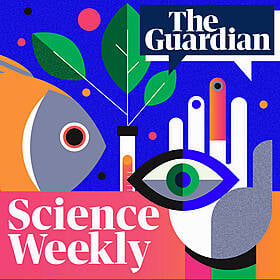
Your microbiome questions answered: part two
29 May - 18 minsIan Sample is joined by Dr James Kinross, colorectal surgeon and author of the book Dark Matter: The New Science of the Microbiome, to answer all your questions about gut health. In episode two, Kinross explains what else, beyond antibiotics, can damage our microbiome, how we can start to repair it, and gives his top tips for keeping our gut microbes happy. Help support our independent journalism at theguardian.com/sciencepod

The incredible world of animal medicine
Ian Sample meets Jaap de Roode, professor of biology at Emory University in Atlanta, and author of the book Doctors by Nature: How Ants, Apes and Other Animals Heal Themselves. De Roode explains how a chance discovery got him interested in animal medicine, the amazing ways that creatures use toxins to fight parasites and pathogens, and what humans have learnt about medicine from the animal world. Help support our independent journalism at theguardian.com/sciencepod
16 mins
3 June Finished

Your microbiome questions answered: part one
Ian Sample is joined by James Kinross, colorectal surgeon and author of the book Dark Matter: The New Science of the Microbiome, to answer all your questions about gut health. In episode one, James explains how the gut microbiome gets set up, how it impacts our early development, and the effect antibiotics can have on our microbes. Help support our independent journalism at theguardian.com/sciencepod
17 mins
27 May Finished

The extraordinary promise of gene editing
Doctors in the US have become the first to treat a baby with a customised gene-editing therapy after diagnosing the child with a severe genetic disorder that kills about half of those affected in early infancy. Ian Sample explains to Madeleine Finlay how this new therapy works and how it paves the way for even more complex gene editing techniques. David Liu, a professor at the Broad Institute of MIT and Harvard and the inventor of these therapies, also describes the barriers that could prevent them reaching patients, and how he thinks they can be overcome. Help support our independent journalism at theguardian.com/sciencepod
16 mins
22 May Finished

The latest twist in a Canadian medical mystery
In March 2021, the Toronto-based reporter Leyland Cecco heard about a memo sent by New Brunswick health officials that warned about a possible unknown neurological syndrome thought to be affecting about 40 people. Since then the story has taken many twists and turns, most recently with a peer-reviewed study that concludes there is no mystery illness after all. Cecco tells Madeleine Finlay about the devastating symptoms that patients experienced, and why the research is unlikely to resolve the conflict over what has been causing them. Help support our independent journalism at theguardian.com/sciencepod
19 mins
20 May Finished

Is it time to try geoengineering?
Geoengineering, the controversial set of techniques that aim to deliberately alter the Earth’s climate system, may be inching a step closer to reality with the announcement that UK scientists will be conducting real-world experiments in the coming years. To understand what’s happening, Ian Sample is joined by the Guardian environment editor Damian Carrington. Damian explains what the experiments will entail and why scientists are so divided on whether pursuing this research is a good idea. Help support our independent journalism at theguardian.com/sciencepod
14 mins
15 May Finished





















